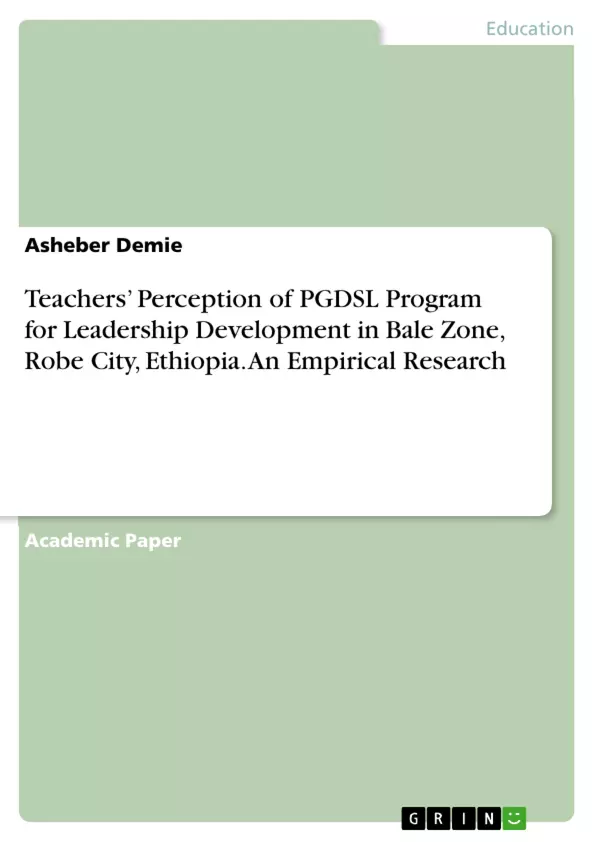The purpose of this seminar essay is to investigate teachers´ perception of the PGDSL (Post Graduate Diploma in School Leadership) program for leadership development in Bale Zone, Robe City, Ethopia in selected primary and secondary schools.
Quantitative and Qualitative research approaches using correlation survey research design are used and data was gathered through questionnaires and semi-structured interviews.
The participants for this study were selected by simple random sampling and purposive sampling. A total population of 232 teachers and 10 school principals and vice principals was sent questionnaires, from whom the answers of one hundred thirty two (132) selected teachers were used, as well as semi stuctured interviews for ten (10) school principals. The quantitative data was analysed using descriptive statistics (percentage, mean standard deviation) and inferential statistics. Correlations whereas qualitative data was analszed by Major themes and sub themes are described by inductive process.
The finding of this study reveals that teachers, overall, positively perceive the PGDSL Program for leadership.
Inhaltsverzeichnis (Table of Contents)
- TABLE OF CONTENTS
- LIST OF FIGURES
- ACRONYMS AND ABBREVIATIONS
- ABSTRACT
- 1. INTRODUCTION
- 1.1. Background of the Study
- 1.2. Statement of the Problem
- 1.3. Research questions
- 1.4. Objectives
- 1.4.1. General objective
- 1.4.2. Specific objectives
- 1.5. Significance of the Study
- 1.6. Limitations of the Study
- 1.7. Delimitation of the Study
- 1.8. Definition of key Terms
- 2. REVIEW OF RELATED LITERATURE
- 2.1. Leadership
- 2.2. School Leadership
- 2.3. Post Graduate Diploma in School Leadership (PGDSL) Program
- 2.4. Leadership Development
- 2.4.1. Professional Development
- 2.4.2. Leadership Skill Development
- 2.4.2.1. Conceptual Skills
- 2.4.2.2. Human Skills
- 2.4.2.3. Technical Skills
- 2.5. Necessity of (PGDSL) Program
- 2.6. Policy Issues
- 2.7. Conceptual Frame Work
- 3. METHODOLOGY AND RESEARCH DESIGN
- 3.1. Research Design
- 3.2. Description of the Study Area
- 3.3. Source of Data
- 3.3.1. Primary Sources
- 3.4. Sample Size and Sampling Techniques
- 3.4.1. Sampling Techniques
- 3.5. Data Gathering Tools
- 3.5.1 Questionnaire
- 3.5.2. Interview
- 3.6. Validity and Reliability
- 3.6.1. Validity
- 3.6.2. Reliability of the Instruments
- 3.7. Methods of Data Analysis
- 3.8. Ethical Considerations
- 4. RESULTS AND DISCUSSION
- 4.1. Data Presentation and Analysis
- 4.2. Knowledge, Skills and Attitudes Acquired from PGDSL Program
- 4.2.1. Leading Continuous Professional Development (CPD)
- 4.2.2. Management of Educational Change
- 5. SUMMARY, CONCLUSIONS AND RECOMMENDATIONS
- 5.1. Summary
- 5.2. Recommendations
- 5.3. Future Research Implication
- REFERENCES
- APPENDICES
Zielsetzung und Themenschwerpunkte (Objectives and Key Themes)
This seminar essay explores the perception of teachers in Bale Zone, Robe City, Ethiopia towards the Post Graduate Diploma in School Leadership (PGDSL) program and its impact on leadership development in selected primary and secondary schools. The research aims to investigate the knowledge, skills, and attitudes teachers acquire through the program, while also examining the challenges faced in its implementation.
- Teachers' perception of the PGDSL program
- The impact of the PGDSL program on leadership development
- The knowledge, skills, and attitudes acquired by teachers through the program
- Challenges faced in the implementation of the PGDSL program
- The contribution of the PGDSL program to continuous professional development (CPD)
Zusammenfassung der Kapitel (Chapter Summaries)
The essay begins with an introduction outlining the background, problem statement, research questions, objectives, significance, limitations, delimitation, and definition of key terms. Chapter two provides a comprehensive review of related literature on leadership, school leadership, the PGDSL program, leadership development, and the necessity of the program. It also examines policy issues and presents a conceptual framework.
Chapter three delves into the methodology and research design, discussing the research design, study area, data sources, sample size and sampling techniques, data gathering tools, validity and reliability, methods of data analysis, and ethical considerations. Chapter four presents the results and discussion, analyzing data on teachers' perceptions of the PGDSL program, the knowledge, skills, and attitudes acquired, and the challenges faced. Finally, the essay concludes with a summary, recommendations, and implications for future research.
Schlüsselwörter (Keywords)
The primary keywords and focus topics of this seminar essay include teachers' perception, PGDSL program, leadership development, school leadership, knowledge, skills, attitudes, continuous professional development (CPD), and challenges. This research examines the effectiveness of the PGDSL program in enhancing leadership skills and promoting educational change within the context of selected primary and secondary schools in Bale Zone, Robe City, Ethiopia.
- Arbeit zitieren
- Asheber Demie (Autor:in), 2019, Teachers’ Perception of PGDSL Program for Leadership Development in Bale Zone, Robe City, Ethiopia. An Empirical Research, München, GRIN Verlag, https://www.grin.com/document/492677



